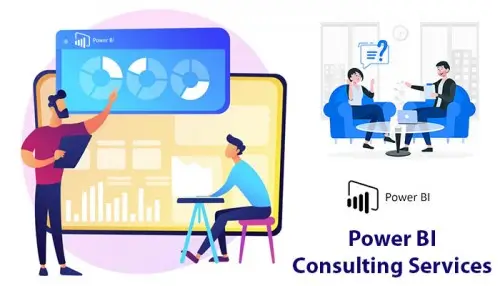One thing that a business is mostly concerned about is its past and current status. There are various factors such as marketing numbers, human resources, company budgeting, sales volumes, etc. that affect a company’s growth and productivity. The data can be collected from various domains but as a business you must be keen on extracting value from data rather than simply gathering it.
Business Intelligence is a bunch of technologies and practices for transforming business data into actionable reports. As an independent industry, BI has given birth to numerous roles and professions as of now. But do you know the skills required to hire a Power BI developer?
Readout this article to explore more about the roles, responsibilities, background, and required skills of a BI developer.
Key BI components
Business Intelligence is divided into 3 layers, with each layer requiring a separate expert. Let’s understand it in detail.
1. Data Source
It is the first layer of BI. Storage like cloud, database or excel files, etc. is required to safely store and retrieve data. The data source is a critical part since it’s the foundation for the next BI stages and commonly, ETL designers are liable for building a foundation for data stockpiling.
2. Data Warehouses
At this stage data is transformed into one place called a database. That is the place where data is standardized to be accessed from the database. Warehouses are developed by ETL or database engineers.
3. BI Reporting
At this stage data is visualized through a BI interface. Business intelligence reporting is the primary responsibility as well as a most important concern of BI developers
Roles and Responsibilities of Business Intelligence Developers
Since BI developers plan and implement strategies as well as roadmaps to address the company’s data challenges, they translate the company’s data into useful insights for stakeholders to make the right business decisions.
BI developers are assigned the task of building a BI interface that collects data from separate sources and makes hypotheses. Since this is a tedious task so, BI developers are advised to utilize their research results to foster practical ideas which are useful to the organization.
Another additional responsibility will be managing data initiatives across the organization. Here the business intelligence developer acts as middle man and coordinates with the project team’s progress with the help of various other data tools and systems.
Typical responsibilities of a business intelligence developer are such as-
1. Defining a BI interface
BI interfere defining is one of the most important business requirements. The company’s domain acts as the foundation for BI interference choosing and BI developers consider this while deciding the types of data to be visualized and the display format for end-users.
2. Setting tech demands
Once the business requirements are aligned, BI developers transform them into technical requirements to build an interface for the end-users. Business intelligence developers decide the type of visualization along with the user interaction with this visualized data. BI developers also hold the responsibility of supervising all the development processes of the BI interface.
3. Development
BI developer is not only responsible for the development process but also for testing and maintenance of the product.
4. Object relations reporting
Data models contain various interrelated objects and relations among these objects show how the data is presented to users. BI developer has to make sure correct relations are established between objects within data models.
5. Warehousing system development
BI developers can take the responsibility for building a warehouse with the help of ETL developers. Even though the architecture of the warehouse won’t affect much data visualization.
6. Documentation
Along with building the warehouse, BI developers can also participate in the documentation of the warehouse’s system architecture. The data documentation covers detailed data explanation with algorithms, variables and relations hence, it is very important for BI developers.
7. Writing tech guides
For making it understandable and easy for the end-users, BI developers have to come up with structured and straightforward tech guides.
BI Development Skills
BI developers should have multiple skillsets because different projects present different challenges. Here are some business intelligence skills that define an excellent BI candidate.
1. Strong tech background
It is very much important for a developer to possess strong knowledge of Python, JavaScript, and other programming languages to build a Business Intelligence solution. Along with the programming knowledge, the BI developers should also be familiar with data formats, data visualization tools along with warehouse architectures.
2. BI tools
BI designers should be knowledgeable in their tech stack to redo BI tools like Apache Superset or Hadoop to the task appropriately.
3. Strong database knowledge
BI developers need to have strong database knowledge since they interact with SQL and NoSQL databases to build a functional interface.
4. Quality Assurance
Along with all other roles BI developers are also responsible for ensuring the quality of BI interfaces before presenting them to the end-users.
5. Solid software development skills
Since BI developers handle various responsibilities and every project require different skills like some of the projects require a mobile BI interface whereas some require desktop ones which is why software development skill is a must for this role.
Conclusion
Adding a BI engineer to your team implies turning out to be more information-driven than ever. Most of the business decisions will be based on structured and visualized data. This makes your imagination and efforts come into reality. A BI developer acts as an interpreter of data to the business language.
The primary role of a business developer should be building a steady BI interface for appropriate data visualization to enable businesses to make the right decision based on it. However, organizations can hire senior developers if they have data presentations like higher needs. We, at OdiTek Solutions, have highly skilled power BI developers to fulfill all your data integration and visualization needs. Reach out to us today to explore more about our business intelligence expertise.







